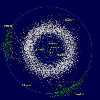
Ice Found on Asteroid
An asteroid orbiting the sun between Mars and Saturn is adding credence to the theory that asteroids and comets are the source of Earth's water and organic material. Scientists observing 24 Themis, an asteroid about 300 million miles (479 million kilometers) from the sun, found that it contains both water--in the form of ice--and organic compounds. Before this observation was made, it was believed that asteroids' proximity to the sun causes them to be devoid of water. Comets, which form farther out in space, were previously known to possess water. More ... DiscussWow! An article catches a student's eye...Use that interest! How?
You can use the science article in other subjects, such as English Language Arts (ELA) or English-as-a-second(or, foreign)-language (ESL or EFL). Vocabulary Words might include:
- asteroid
- credence
- comets
- devoid
- proximity
- organic
- organic compounds
An asteroid orbiting the sun between Mars and Saturn is adding credence to the theory that asteroids and comets are the source of Earth's water and organic material.
versus
An asteroid, orbiting the sun between Mars and Saturn, is adding credence to the theory that asteroids and comets are the source of Earth's water and organic material.
Do the commas change the meaning?
You can use the science article in mathematics. Topics might include converting units of measure or looking at representing large numbers:
Scientists observing 24 Themis, an asteroid about 300 million miles (479 million kilometers) from the sun, found that it contains both water--in the form of ice--and organic compounds.A quick converter is here, but, how does one calculate it by thought?
http://translatorbar.com/unitconverter.php
Here's a calculator used in teaching Japanese students English:
http://www.teaching-english-in-japan.net/conversion/miles
Still, what is the thought process?
Here's a, simple," way to convert miles to kilometers using Fibonacci numbers:
http://www.eudesign.com/mnems/milekms.htm. The mnemonic or memory, device presented is interesting and useful, but, our question remains...What is the thought process...the step-by-step? How can you teach this concept of conversion?
http://www.sparknotes.com/math/prealgebra/measurements/section3.rhtml Spark notes provides some guidance:
Converting Measurements
We can convert measurements from one unit to another unit within the same system (English or Metric) or between the two systems. Let's say a piece of land is 2.3 square miles, but the contractor needs to know the area in acres. How would he convert the measurement?
To convert measurements, it is necessary to know conversion factors between measurements. A conversion factor is a clever way of writing 1 as a fraction in which the numerator is equal to the denominator but the numerator and the denominator have different units. For example, (1,000 m)/(1 km) is a conversion factor because 1,000 m = 1 km. (1 ft)/(12 in) is a conversion factor because 1 ft = 12 in.
An important fact to remember is that when fractions are multiplied, numbers in the numerator and numbers in the denominator cancel out, as shown in Fractions. Also, units in the numerator and the denominator cancel out: if a unit appears in both the numerator and the denominator, we can cross both units out. For example:
×
=
×
= 5, 000 m
The above quoted text is from http://www.sparknotes.com/math/prealgebra/measurements/section3.rhtml, Spark notes, accessed May 19, 2010. It should get you started in preparing lessons.
Now for...Really big numbers..."Scientific notation."
More coming: (Read more here) http://read-about-it.blogspot.com/2010/09/big-and-small-of-science-scientific.html









15 comments:
Translations:
The YuriS new said.
When he was in adversity, we are in a gas, eat a bitter, and for an early have their own goals, one day, you will taste the fruits of the United States food. . . . . . . . . . . . . . . .
Thursday, May 27, 2010 6: 03:00 pm PDT
Deleted comments were spam, so I trashed them.
自然是上帝最偉大的神來之筆。 Nature is God's greatest flash in the pan
I think most of these comments were spam and were linked to places I would not trust. I deleted them. If you were sincere, please post again without any links.
Thanks, Dr-J
Post a Comment